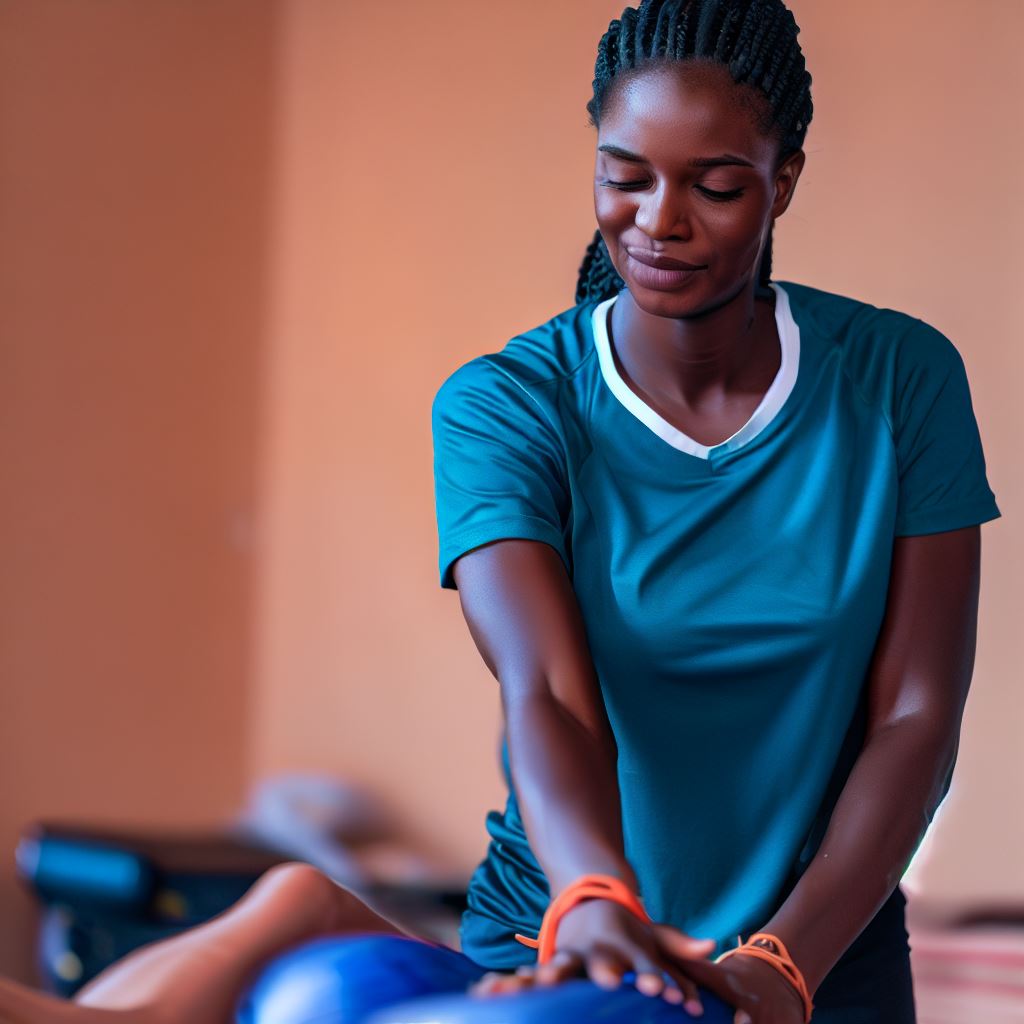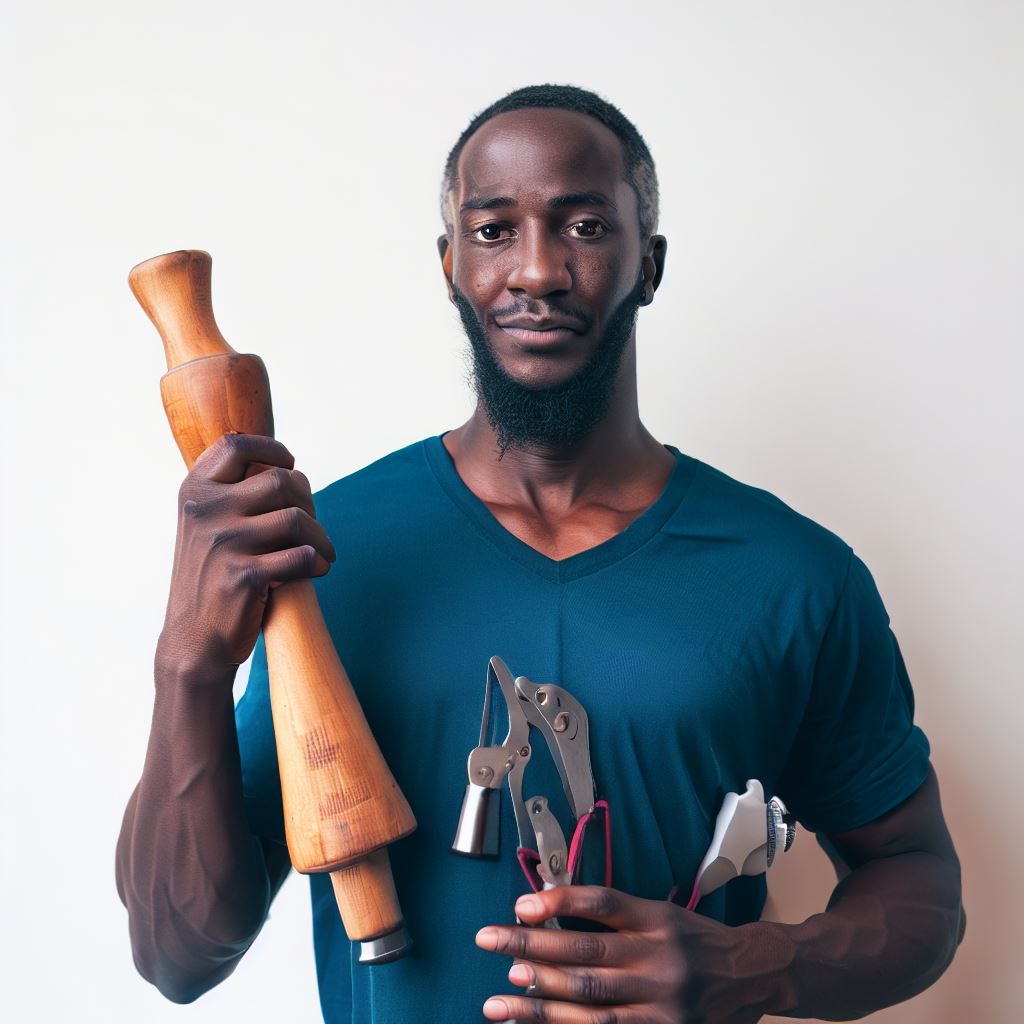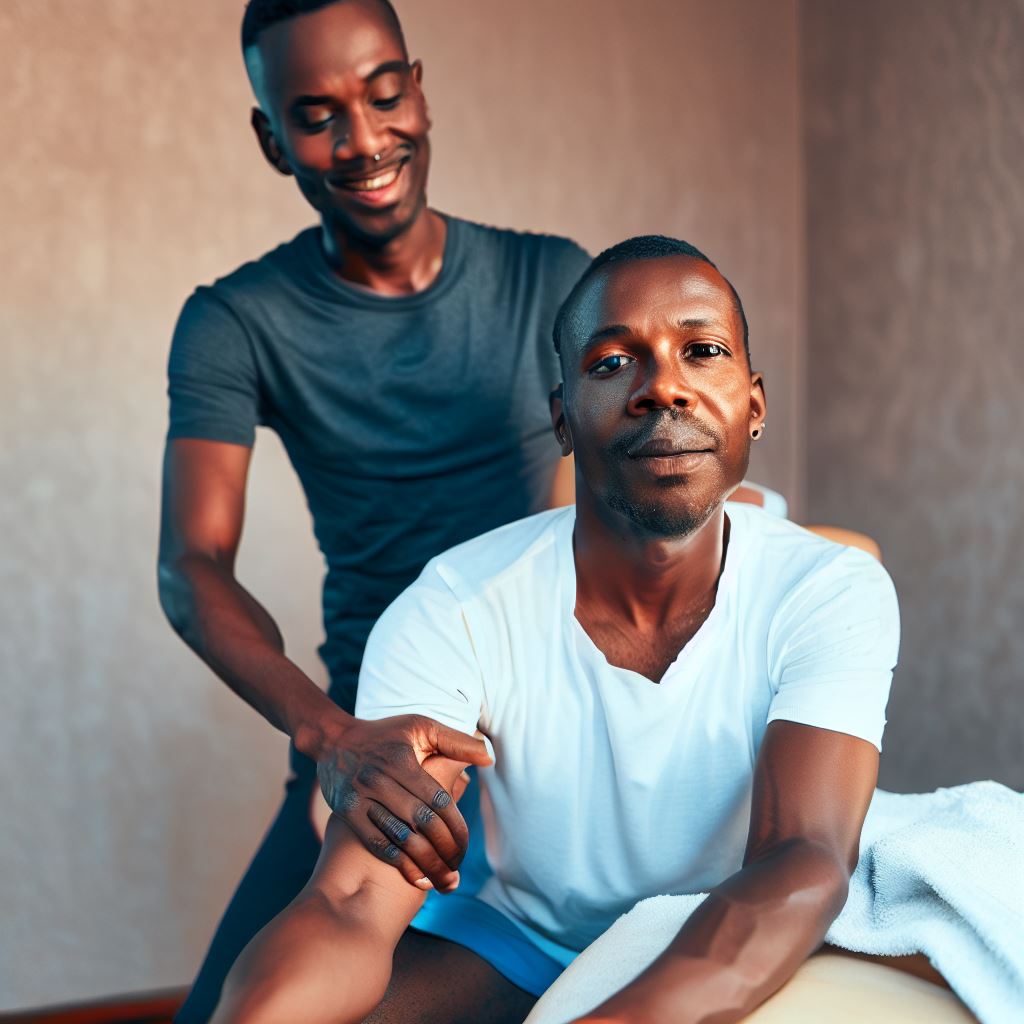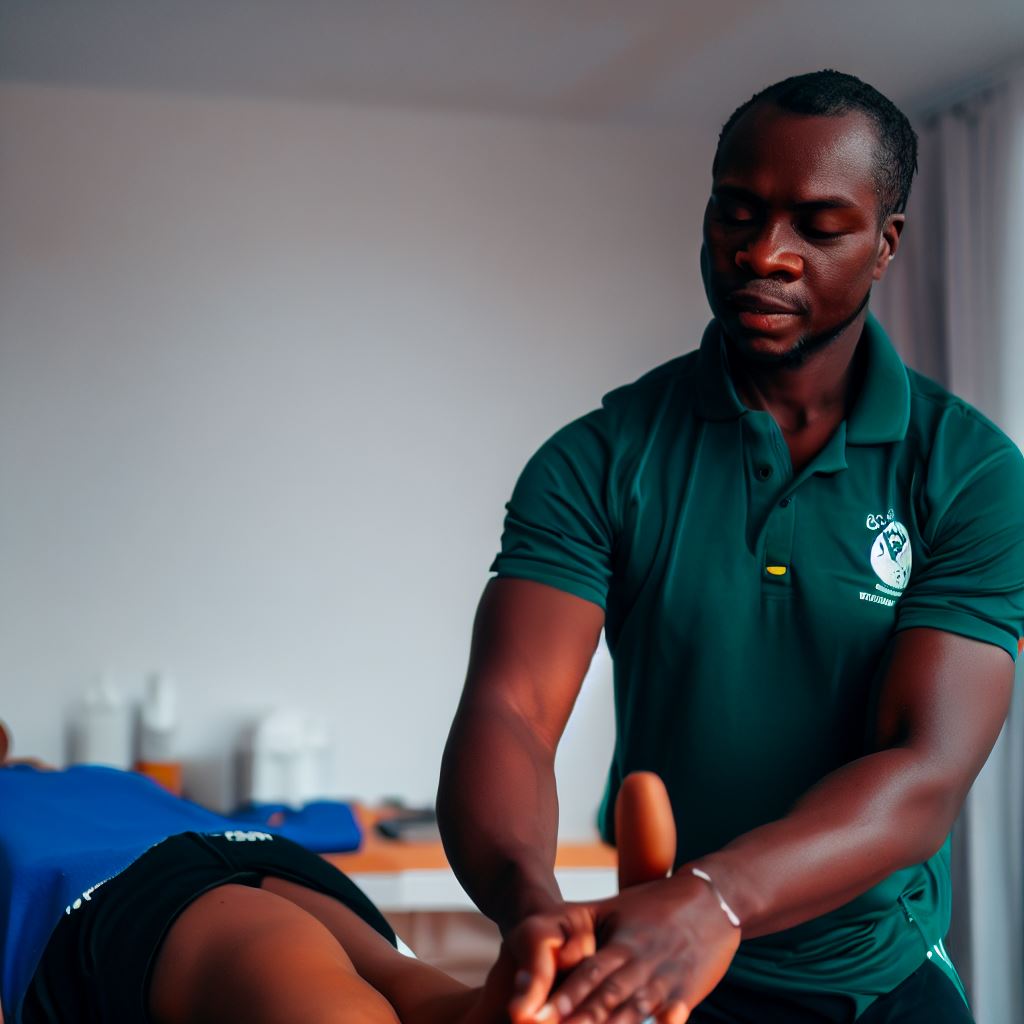Introduction
Sports massage therapy is a vital aspect of the sports industry, ensuring athletes’ optimal performance and recovery.
In Nigeria, sports massage therapists face various challenges in delivering these services.
This blog post discusses the challenges encountered by sports massage therapists in Nigeria, exploring their impact on the industry and the potential solutions.
What sports massage therapy is
Sports massage therapy involves the application of manual techniques to the soft tissues of athletes, aiming to enhance their performance, prevent injuries, and aid in rehabilitation.
Therapists use specific techniques tailored to the athlete’s needs and goals.
Importance of sports massage therapy in enhancing athletic performance
Sports massage therapy plays a crucial role in improving athletic performance by increasing blood circulation, reducing muscle tension, and enhancing flexibility.
It also helps prevent injuries and promotes faster recovery post-activity.
Brief overview of the sports massage therapy industry in Nigeria
In Nigeria, the sports massage therapy industry is still relatively young and faces several challenges, including limited awareness and understanding of the therapy’s benefits.
Therapists struggle with a lack of standardized training programs and a shortage of qualified professionals.
Sports massage therapy is invaluable in the sports industry, but Nigerian therapists encounter obstacles that hinder their effectiveness.
Despite these challenges, there is a growing recognition of its importance, and efforts are underway to overcome the obstacles and improve the industry’s standards.
Lack of Awareness and Understanding
Athletes and coaches in Nigeria have limited knowledge about the benefits of sports massage therapy.
Many individuals perceive massage as a luxury or indulgence rather than a necessary treatment for athletes.
Lack of awareness and understanding leads to underutilization of sports massage therapy in Nigeria.
Limited Knowledge among Athletes and Coaches
Athletes and coaches often lack comprehensive knowledge about the benefits and techniques of sports massage therapy.
Limited knowledge hinders athletes from incorporating massage therapy into their training routines.
Coaches may not prioritize or recommend sports massage therapy due to their own limited understanding.
Perception of Massage as a Luxury
Massage therapy is often seen as a luxury service rather than an essential component of athletic performance and recovery.
This perception makes it difficult for sports massage therapists to secure regular clients and sustainable business opportunities.
The notion of massage as a luxury needs to be transformed into an understanding of its significance in athletic development.
Importance of Education and Awareness Campaigns
Efforts should be made to educate athletes, coaches, and the general public about the benefits and necessity of sports massage therapy.
Awareness campaigns can emphasize how massage therapy enhances athletic performance, prevents injuries, and facilitates recovery.
Collaborations between sports massage therapists, sports associations, and educational institutions can help address the lack of awareness and understanding.
1. Workshops, seminars, and public demonstrations
By conducting workshops, seminars, and public demonstrations, sports massage therapists can showcase the positive effects of their therapy on athletes’ performance and well-being.
Education and awareness campaigns should target not only athletes and coaches but also parents and guardians.
They need to understand the potential long-term benefits and the role sports massage therapy can play in preventing injuries and improving overall athletic performance.
It is also essential for sports massage therapists to build relationships and networks within the sports community.
By actively engaging with athletes, coaches, and sports associations, therapists can create trust and establish themselves as valuable resources.
2. Offering free introductory sessions or discounted rates
In addition, offering free introductory sessions or discounted rates can attract athletes and help debunk the perception that massage therapy is solely a luxury.
By providing evidence-based results and testimonials from athletes who have benefitted from sports massage therapy, therapists can further strengthen the understanding of its importance.
Addressing the challenges faced by sports massage therapists in Nigeria requires both individual efforts and collective action.
Therapists must actively promote the benefits of their profession and collaborate with relevant stakeholders to create a culture of education, awareness, and acceptance of sports massage therapy.
With increased knowledge and understanding, athletes and coaches can fully embrace the significant advantages that sports massage therapy offers.
Read: Top Clinics for Sports Massage Therapy Treatment in Nigeria
Limited Access to Quality Training and Certification
One of the major challenges faced by sports massage therapists in Nigeria is limited access to quality training and certification.
Lack of accredited sports massage therapy training institutions in Nigeria
There is a lack of accredited sports massage therapy training institutions in Nigeria, making it difficult for aspiring therapists to receive proper education and certification.
This poses a problem as proper training is essential for therapists to acquire the necessary skills and knowledge to perform their job effectively.
Difficulty in obtaining recognized certifications
Additionally, the difficulty in obtaining recognized certifications further hinders the progress and professional growth of sports massage therapists.
Without proper certifications, therapists may struggle to gain credibility and establish trust among their clients and peers.
Need for collaboration between local and international organizations to provide training opportunities
In order to address these challenges, there is a need for collaboration between local and international organizations.
By partnering with established training institutions and organizations from around the world, Nigeria can provide more training opportunities for sports massage therapists.
These collaborations can help bring in experienced trainers and educators who can provide high-quality training programs for aspiring therapists.
Furthermore, international partnerships can also facilitate the accreditation and recognition of sports massage therapy certifications in Nigeria.
This would not only improve the professional standing of therapists but also open up more opportunities for employment and career advancement.
Another aspect that needs to be addressed is the lack of awareness and understanding about sports massage therapy in Nigeria.
Many individuals are still unfamiliar with the benefits and significance of sports massage therapy for athletes and active individuals.
Efforts should be made to educate the public and promote the importance of sports massage therapy in enhancing performance, preventing injuries, and promoting recovery.
By creating awareness, more individuals may consider pursuing a career in sports massage therapy, leading to an increased demand for qualified therapists.
Basically, sports massage therapists in Nigeria face significant challenges due to limited access to quality training and certification.
However, through collaboration between local and international organizations, these challenges can be overcome.
Increased training opportunities, accreditation, and awareness can contribute to the growth and professional development of sports massage therapy in Nigeria.
Read: Cultural Aspects of Sports Massage Therapy in Nigeria
Limited Integration in Sports Medicine Teams
Sports massage therapists in Nigeria face several challenges in their profession, particularly in regards to their limited integration in sports medicine teams.
These challenges include:
Limited Integration in Sports Medicine Teams
One major challenge faced by sports massage therapists in Nigeria is the struggle to be recognized as an integral part of sports medicine teams.
Often, they are not given the same level of importance as other professionals.
Lack of Appreciation for Their Contributions and Expertise
Another challenge faced by sports massage therapists in Nigeria is the lack of appreciation for their contributions and expertise.
Their skills and knowledge are often overshadowed by other members of the sports medicine team.
Importance of Building Relationships with Sports Medicine Professionals and Organizations
It is crucial for sports massage therapists in Nigeria to build relationships with other sports medicine professionals and organizations.
This can help them gain recognition and establish themselves as valuable members of the team.
Generally, sports massage therapists in Nigeria face challenges in terms of limited integration in sports medicine teams, lack of appreciation for their contributions and expertise, and the importance of building relationships with sports medicine professionals and organizations.
These challenges hinder their ability to fully contribute to the field of sports medicine in Nigeria.
Read: A Day in the Life of a Nigerian Sports Massage Therapist

Lack of Supportive Infrastructure
In Nigeria, sports massage therapists face numerous challenges that hinder the delivery of effective services.
- The absence of a supportive infrastructure makes it difficult for sports massage therapists to operate efficiently.
- Without proper infrastructure, therapists struggle to provide the necessary care and support to athletes.
- The lack of a well-established system limits their ability to deliver high-quality services.
- This issue is particularly problematic in remote areas, where access to infrastructure is even more limited.
Shortage of well-equipped sports massage therapy centers or facilities
- The scarcity of well-equipped sports massage centers poses a major challenge for therapists in Nigeria.
- The lack of these facilities hampers therapists’ capabilities to provide adequate care and treatment.
- A shortage of such specialized centers also limits the number of athletes who can benefit from their services.
- A substantial investment is required to establish well-equipped sports massage therapy centers across the country.
Limited availability of specialized equipment and tools
- Sports massage therapists in Nigeria have difficulty accessing the necessary specialized equipment and tools.
- The unavailability of these resources hinders their ability to administer appropriate and effective treatments.
- The lack of specialized equipment also limits therapists’ options for therapeutic interventions.
- Efforts should be made to enhance the procurement and distribution of these essential tools.
Need for investment and development in infrastructure to support sports massage therapy services
- It is crucial for Nigeria to invest in the development of infrastructure that supports sports massage therapy services.
- Improving infrastructure will enable therapists to offer the best possible care to athletes.
- Increased investment will facilitate the establishment of well-equipped centers and improve accessibility.
- Furthermore, it will enhance the overall quality and availability of sports massage therapy services in the country.
Essentially, sports massage therapists in Nigeria face numerous challenges due to a lack of supportive infrastructure, shortage of well-equipped centers, limited availability of specialized equipment, and the need for investment and development in infrastructure.
Addressing these issues is essential to improve the delivery of sports massage therapy services and promote the well-being of athletes in Nigeria.
Read: Sports Massage Therapy as a Female Profession in Nigeria
Find Out More: Nigerian Hospitality: Receptionist’s Role & Influence
Cultural and Social Barriers
In Nigeria, sports massage therapists face various challenges due to cultural and social barriers.
- One major challenge is the stigma associated with touch therapy in some Nigerian communities.
- Many people believe that massage is only used for relaxation purposes or for treating injuries.
- As a result, sports massage therapy may be seen as unnecessary or even inappropriate in certain situations.
- Additionally, religious and cultural beliefs play a significant role in deterring individuals from seeking sports massage therapy.
- In some communities, physical touch from strangers is considered taboo or immoral.
- Furthermore, there is a misconception that sports massage may interfere with individuals’ spiritual beliefs or practices.
The Importance of Addressing These Barriers
It is crucial to address these cultural and social barriers to ensure that sports massage therapy is accessible to all individuals.
- Firstly, awareness and education about the benefits of sports massage therapy need to be disseminated.
- By highlighting the positive effects, such as improved athletic performance and injury prevention, misconceptions can be dispelled.
- Moreover, cultural sensitivity is vital in understanding and respecting diverse beliefs and practices.
- Sports massage therapists should be trained to adapt their techniques according to cultural preferences and boundaries.
- Engaging local leaders and influential figures within communities can also help overcome these barriers.
- By gaining their support and endorsement, the perception of sports massage therapy can be positively transformed.
Strategies to Overcome Stigma and Beliefs
To overcome the stigma associated with touch therapy and address religious and cultural beliefs, several strategies can be employed:
- Conducting educational workshops and seminars to increase awareness about the benefits and safety of sports massage therapy.
- Providing evidence-based research studies that support the effectiveness of sports massage in improving physical performance.
- Collaborating with religious leaders to promote acceptance and understanding of sports massage therapy within their congregations.
- Encouraging open dialogue and discussions to address any concerns or objections related to cultural or religious beliefs.
- Offering customized sports massage sessions that respect individual boundaries and preferences.
While sports massage therapy offers numerous benefits for athletes and individuals, it faces cultural and social barriers in Nigeria.
By addressing the stigma associated with touch therapy and understanding religious and cultural beliefs, these barriers can be overcome.
Through education, cultural sensitivity, and open dialogue, sports massage therapists can create a more inclusive and accessible environment.
It is vital to ensure that individuals have the opportunity to experience the physical and mental benefits of sports massage therapy without prejudice or hinderance.
Read: Economic Impact of Sports Massage Therapy in Nigeria
Regulatory and Legal Challenges
Challenges Faced by Sports Massage Therapists in Nigeria
In Nigeria, sports massage therapists encounter various challenges, including regulatory and legal obstacles.
These challenges have a significant impact on the profession’s recognition and protection.
Let’s take a closer look at these challenges:
1. Lack of legal recognition for sports massage therapists in Nigeria
One major challenge faced by sports massage therapists in Nigeria is the absence of legal recognition for their profession.
This lack of recognition undermines the credibility and legitimacy of their work.
2. Absence of regulations and licensing requirements
Another challenge is the absence of specific regulations and licensing requirements for sports massage therapists.
Without these standards, anyone can claim to be a therapist, leading to a lack of professionalism and endangering clients’ well-being.
3. Importance of advocating for regulatory measures to protect therapists and clients alike
It is crucial to advocate for regulatory measures to protect both sports massage therapists and their clients.
Implementing regulations would establish a framework of accountability and ensure that therapists meet certain standards of education and practice.
Regulatory and Legal Challenges
The lack of legal recognition for sports massage therapists creates numerous challenges for individuals pursuing a career in this field in Nigeria.
Without legal recognition, therapists face difficulties in establishing their credibility and gaining the trust of potential clients.
Publish Your Professional Profile, Business or Brand
Showcase your expertise, gain trust, and boost visibility instantly on Professions.ng.
Publish NowIn addition to the lack of recognition, the absence of regulations and licensing requirements poses significant challenges.
The absence of guidelines and standards allows unqualified individuals to offer sports massage services, potentially causing harm or delivering inadequate treatment.
Advocating for regulatory measures is crucial in addressing these challenges and protecting both therapists and their clients.
Implementing regulations will ensure that therapists operate within a defined scope of practice, possess appropriate qualifications, and adhere to ethical guidelines.
By advocating for regulation, sports massage therapists can enhance their professional credibility and help establish the legitimacy of their field as an integral part of healthcare in Nigeria.
Benefits of Regulatory Measures
Introducing regulatory measures and licensing requirements for sports massage therapists would bring several benefits to the profession and society as a whole.
These benefits include:
- Enhanced professionalism: Regulations would promote professionalism within the sports massage industry, ensuring that only qualified individuals provide services.
- Client protection: Through regulations, clients can be confident that their therapists have met specific educational and ethical standards, ensuring their well-being.
- Industry growth: With clear guidelines and standards, the sports massage industry can flourish, attracting more individuals to pursue careers in this field and contributing to the nation’s overall healthcare system.
- Improved reputation: Regulatory measures would enhance the reputation of sports massage therapy, elevating its status and recognition among healthcare professionals and the general public.
In general, sports massage therapists in Nigeria face significant challenges due to the lack of regulatory and legal recognition.
Overcoming these challenges requires advocating for regulatory measures and licensing requirements.
Regulations will enhance professionalism, protect clients, support industry growth, and improve the reputation of sports massage therapy as a valuable healthcare profession.
It is vital for individuals within the industry and relevant authorities to work together to establish these essential measures and shape a promising future for sports massage in Nigeria.
Conclusion
Sports massage therapists in Nigeria face numerous challenges in their profession.
These challenges include a lack of recognition and support from the government and sports organizations, limited access to proper training and education, and a lack of resources and equipment.
Overcoming these challenges is crucial for the growth of the sports massage industry in Nigeria.
Sports massage therapy plays a vital role in preventing injuries, enhancing athletic performance, and facilitating the recovery process.
By addressing these challenges, more athletes can benefit from the services of sports massage therapists, leading to improved sports performance and overall well-being.
To promote the growth of the industry, relevant stakeholders, including the government, sports organizations, and educational institutions, need to collaborate and address these challenges together.
The government should provide support and recognition for sports massage therapy as a legitimate profession.
Sports organizations should include sports massage therapy as an essential part of their training and recovery programs.
Educational institutions should offer comprehensive training programs for aspiring sports massage therapists.
By working together, stakeholders can create an enabling environment for sports massage therapy in Nigeria, ensuring that athletes receive the best possible care and support for their physical well-being.
This collaboration will not only benefit athletes but also contribute to the overall development of Nigerian sports.
It is time to recognize the important role of sports massage therapists and take action to overcome the challenges they face in Nigeria.
Let’s join hands and pave the way for a thriving sports massage industry in Nigeria.




